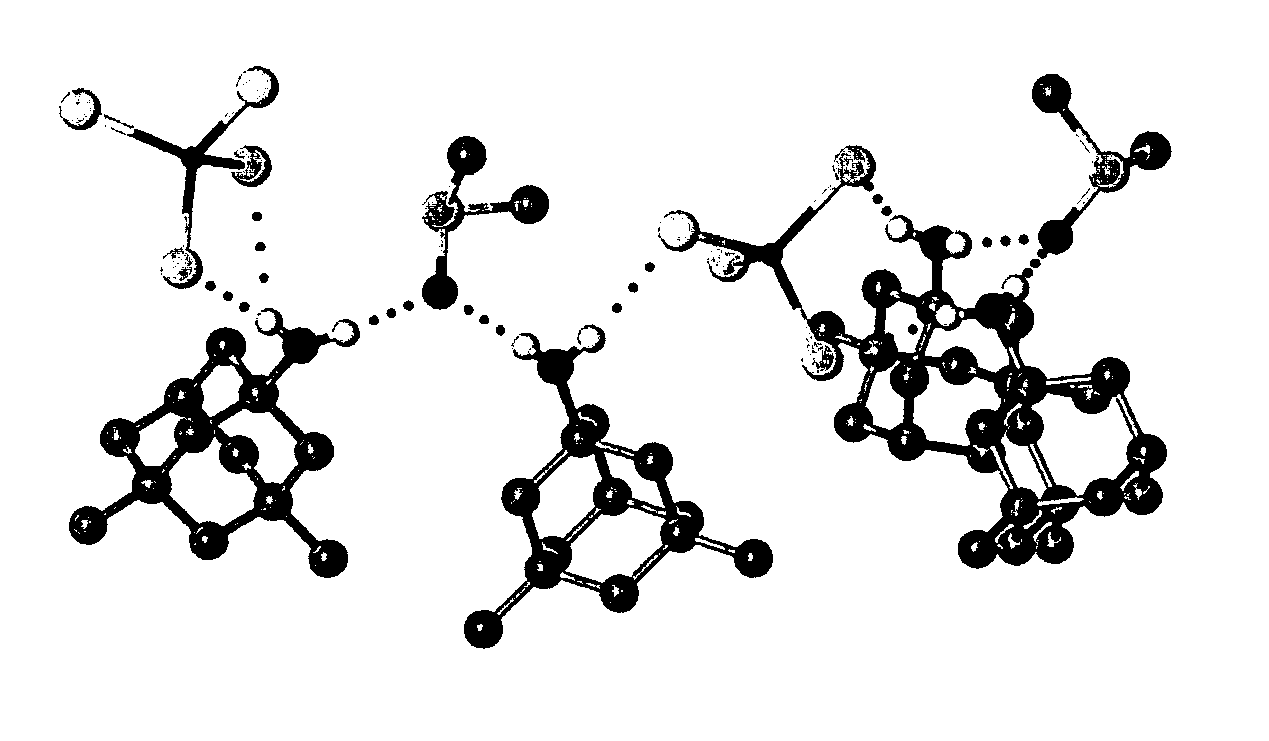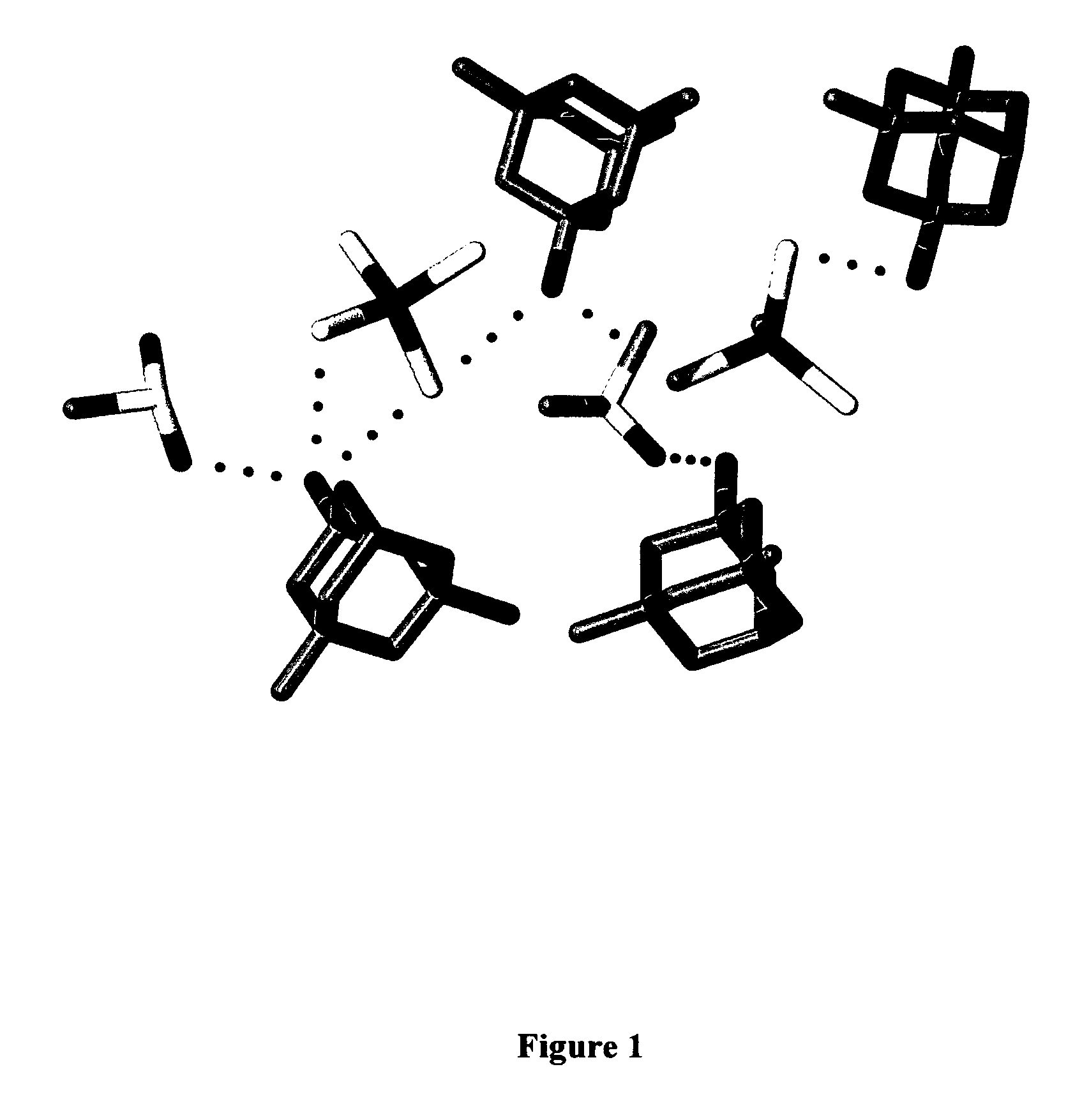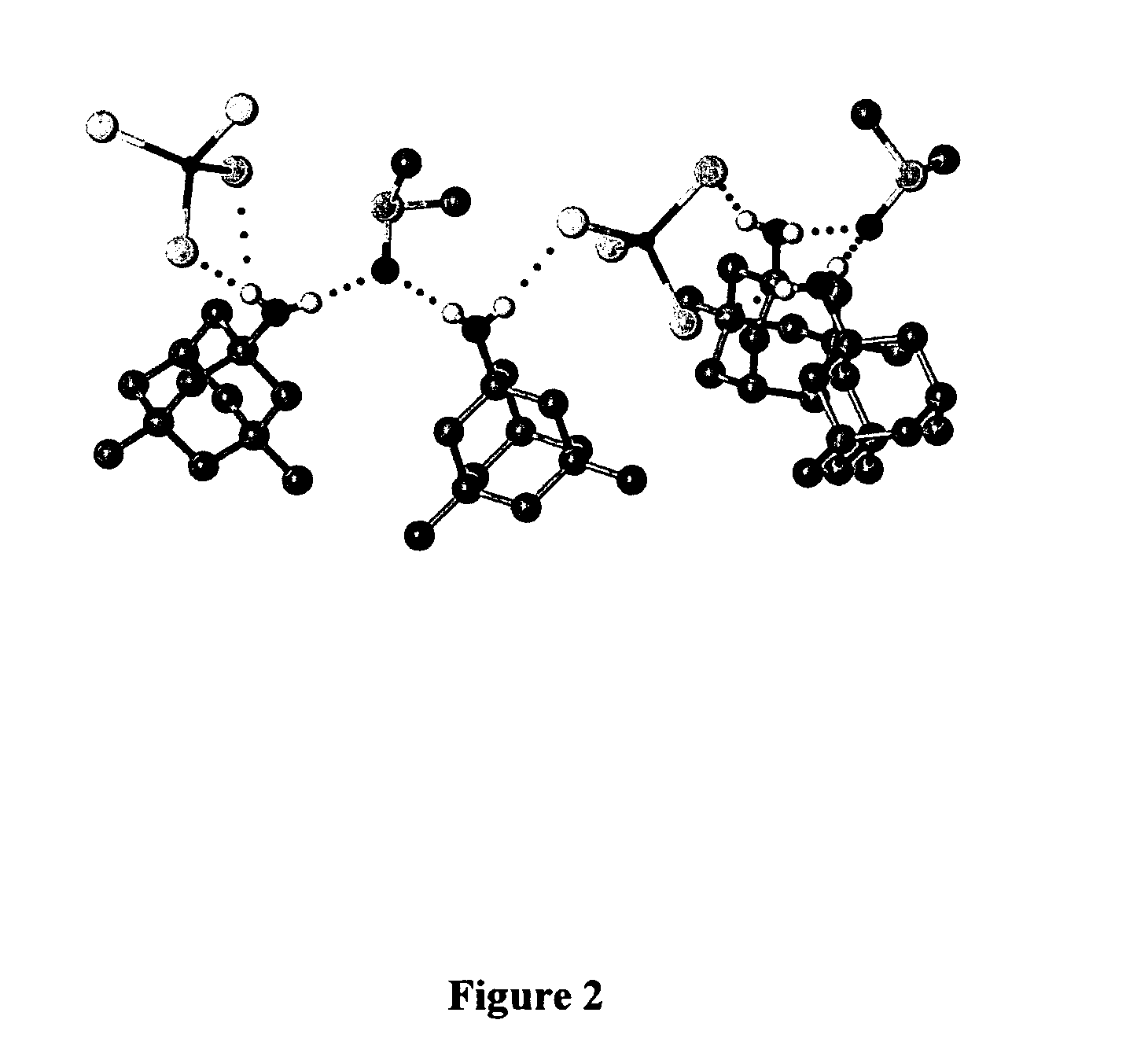Adamantanamines and neramexane salts of thiomolybdic and thiotungstic acids
a technology of neramexane salts and thiomolybdic and thiotungstic acids, which is applied in the direction of heterocyclic compound active ingredients, biocides, drug compositions, etc., can solve the problems of cellular death, affecting neuronal function, and affecting neurotransmission precision,
- Summary
- Abstract
- Description
- Claims
- Application Information
AI Technical Summary
Benefits of technology
Problems solved by technology
Method used
Image
Examples
example 1
Bis(1-ammoniumadamantane) tetrathiomolybdate [Formula (I) A]
[0156]Aminoadamantane (0.90 g, 5.95 mmol, Aldrich) was dissolved in 2-propanol (75 mL) and added to bis(ammonium) tetrathiomolybdate (780 mg, 2.99 mmol) in water (ASTM1, 100 mL) at RT. After mixing for 30 mins., the 2-propanol was removed on a rotary evaporator at RT. The remaining aqueous mixture was stored for 2 h in a refrigerator. The dark orange solid was filtered and washed with cold water (15 mL) and diethyl ether (15 mL). The solid was dried to a constant weight at RT. The product obtained was bis(1-ammoniumadamantane) tetrathiomolybdate (1.50 g, 95% yield) as an orange solid (melting point; 220° C. dec.). Its spectra are as follows:
[0157]1H NMR (300 MHz, DMSO-d6): δ 7.72 (br s, 6H), 2.06 (s, 6H), 1.78 (s, 12H), 1.63 (m 12H);
[0158]13C NMR (75 MHz, DMSO-d6): δ 51.03, 39.80, 35.07, 28.35;
[0159]UV-Vis (ethanol): 318, 243, 193; and
[0160]CHN analysis: Calculated for: C20H36MoN2S4.
[0161]Calculated: C, 45.43; H, 6.86; N, 5...
example 2
Bis(1-methylammoniumadamantane) tetrathiomolybdate [Formula (I), B]
[0163]1-Methylaminoadamantane (0.99 g, 5.98 mmol, Aldrich) was dissolved in 2-propanol (75 mL) and added to bis(ammonium) tetrathiomolybdate (780 mg, 2.99 mmol) in water (ASTM1, 100 mL) at RT. After mixing for 30 mins, the 2-propanol was removed on a rotary evaporator at RT. The remaining aqueous mixture was stored for 2 h in a refrigerator. The dark orange solid was filtered and washed with cold water (15 mL) and diethyl ether (15 mL). The solid was dried to a constant weight at RT. The product was bis(1-methylammoniumadamantane) tetrathiomolybdate (1.60 g, 97% yield) as an orange solid (melting point; 168° C. dec.). Its spectra are as follows:
[0164]1H NMR (300 MHz, DMSO-d6): δ 7.49 (br s, 6H), 2.52 (s, 4H), 1.94 (s, 6H), 1.60 (m, 12H), 1.50 (s, 12H);
[0165]13C NMR (75 MHz, DMSO-d6): δ 50.42, 8.75, 36.08, 31.60, 27.37;
[0166]UV-Vis (ethanol): 318, 243, 193; and
[0167]CHN analysis: Calculated for: C22H40MoN2S4.
[0168]Cal...
example 3
Bis(1-ammonium-3,5-dimethyladamantane) tetrathiomolybdate [Formula (I), A]
[0170]The free base of memantine was prepared from the hydrochloride salt (Acros) by dissolving the salt (1.0 g) in water (25 mL). Sodium hydroxide (2 g) in water (10 mL) was added and the free amine was extracted with DCM (2×25 mL). The combined DCM fractions were dried over anhydrous sodium sulfate, filtered, and concentrated. The remaining clear oil (0.8 g, 4.46 mmol) was dissolved in 2-propanol (30 mL) and added to bis(ammonium) tetrathiomolybdate (580 mg, 2.23 mmol) in warm water (30 mL). After mixing for 30 mins, the 2-propanol was removed on a rotary evaporator at RT. The remaining aqueous mixture was stored for 2 h in a refrigerator. The dark orange solid was filtered and washed with cold water (15 mL) and diethyl ether (15 mL). The solid was dried to a constant weight at RT. This provided as a product bis(1-ammonium-3,5-dimethyladamantane) tetrathiomolybdate (1.15 g, 88% yield) as a dark orange solid ...
PUM
| Property | Measurement | Unit |
|---|---|---|
| humidity | aaaaa | aaaaa |
| temperature | aaaaa | aaaaa |
| temperature | aaaaa | aaaaa |
Abstract
Description
Claims
Application Information
 Login to View More
Login to View More - R&D
- Intellectual Property
- Life Sciences
- Materials
- Tech Scout
- Unparalleled Data Quality
- Higher Quality Content
- 60% Fewer Hallucinations
Browse by: Latest US Patents, China's latest patents, Technical Efficacy Thesaurus, Application Domain, Technology Topic, Popular Technical Reports.
© 2025 PatSnap. All rights reserved.Legal|Privacy policy|Modern Slavery Act Transparency Statement|Sitemap|About US| Contact US: help@patsnap.com



